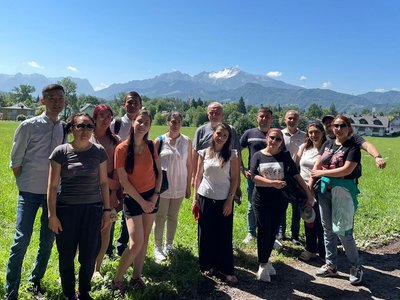

DEvision aims at bringing 'Digital Earth' competences into an array of disciplines beyond 'core' geospatial study programs like Geoinformatics, Geodesy/Surveying or Cartography. During the first project year, development teams were formed contributing to the establishment of Moodle-based open educational resources (OER) for teaching&learning modules on Digital Earth Basics, Geospatial Models and Representations, Geovisualisation and –communication, Remote Sensing and Image Analysis, and Spatial Analysis with integrated elements for Application Development. By April 2023, these modules have become openly available for the general Digital Earth education community through the project website, with teachers having privileged access to feedback channels as well as dedicated teacher resources. In order to warrant longer term maintainability of resources, these are mostly based on existing online materials, with module content allowing for multiple ‘threads’ and variable syllabi managed by individual teachers and controlled by program curricula. This approach is in the very early stages of validation, first classes of ‘test teaching’ of modules and individual sections are expected to create feedback and support the pending accreditation steps in year 2 of DEvision.
Outreach and communication had started with internal workshops and seminars focused on partner institutions and their respective national level contacts. By informing partner university leadership early about objectives and commitments, the project team hopes for a stable buy-in and long-term support important for next steps (integration of Digital Earth into a broad scope of curricula, accreditation, teacher training and directing students). For broader external communication, a project flyer, stickers and a poster were developed to establish visibility of DEvision and its objectives beyond the immediate partners and involved actors. These physical / hardcopy media are also leveraged through social media channels, in particular Twitter, Facebook, (some) Snapchat and LinkedIn – aiming at connecting and strengthening the pertinent educational community in the Caucasus and Central Asia region.
Project management from the outset has been established on the well proven teamwork.com platform, with all actors and stakeholders organized into task-focused teams. This asynchronous communication (and repository) platform is complemented by regular webinars alternating between project management and a teacher training / experience exchange emphasis. Of course the approximately once per semester in-person project meetings fulfill the extremely important task of semi-structured personal exchanges where new topics for discussion and decision emerge.
The initiative to secure a donation of a geospatial cloud platform by an industry leading vendor (Esri) led to a successful implementation early in year 2. This makes the partnership and project independent from University of Salzburg licensed technologies and is in the process of forming a core element of teaching and learning within and beyond the current project.
Based on these already reached milestones, use of DEvision resources in trans-and multidisciplinary bachelor or masters’ program, and in support of specialization certificates to be offered as continuing education as well currently is starting. First experimental teaching has identified a gap in teachers’ readiness to adopt blended concepts, an active learning paradigm and abandoning traditional frontal lecturing and instruction. Facilitating a transition to a guidance, mentoring, consulting and monitoring practice has been identify as a major task to be addressed in year 2 and 3.
